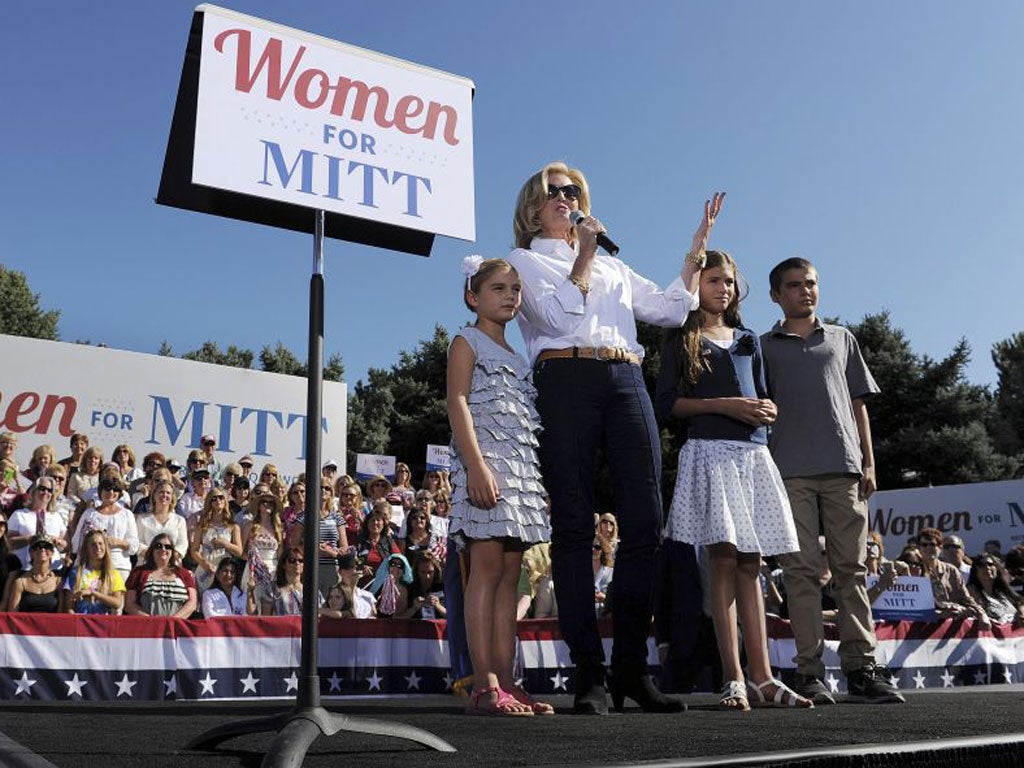Why Mrs Mitt Romney can't bridge the gender gap
She was brought in to appeal to women, but Ann Romney's homely appeal has failed to alter the balance

Your support helps us to tell the story
From reproductive rights to climate change to Big Tech, The Independent is on the ground when the story is developing. Whether it's investigating the financials of Elon Musk's pro-Trump PAC or producing our latest documentary, 'The A Word', which shines a light on the American women fighting for reproductive rights, we know how important it is to parse out the facts from the messaging.
At such a critical moment in US history, we need reporters on the ground. Your donation allows us to keep sending journalists to speak to both sides of the story.
The Independent is trusted by Americans across the entire political spectrum. And unlike many other quality news outlets, we choose not to lock Americans out of our reporting and analysis with paywalls. We believe quality journalism should be available to everyone, paid for by those who can afford it.
Your support makes all the difference.As Mitt Romney hid in his hotel one afternoon early last week, prepping for Wednesday's big debate, his wife, Ann, left to address several hundred supporters in a small park south of Denver. The event was Kodacolor perfect, verging on quaint; more Tupperware than Jay-Z. Even the "Women for Mitt" signs looked decidedly1950s.
The crowd, indeed, was nearly all women (and white) and they adored Mrs Romney as she told stories of her grandchildren – three had, rather shyly, accompanied her on stage – and about her grandfather toiling in the Welsh coal mines. Never mind the reports of nascent griping from within the campaign that, in her role as protector-in-chief of her husband, she has insulated him from criticism more than is good for him. To them, she was pure gold.
Unsurprisingly, most didn't appreciate questions from a reporter about the astonishing gender gap weighing down Mr Romney's bid for the White House. A poll released last week by Quinnipiac University in Connecticut showed Barack Obama walloping Mr Romney by 56 per cent to 38 per cent among women voters across the US. The few who didn't reject the numbers out of hand as somehow false or fictional struggled to make sense of them.
Maybe the determinedly homey style of Mrs Romney when she campaigns doesn't help. If there was ever any notion of her bringing a younger, hipper female constituency into her husband's column, it has clearly been abandoned. Tarryn Skipper, who attended the rally with her four-month-old daughter in a papoose, argued that the gap had been opened by unfair Democrat propaganda. "I think it's partly because that has been their strategy, to keep saying over and over that Mitt Romney doesn't get women – la-la-la. But I don't think that's true."
Valere Mathis, 51, offered that some women in America don't know what's good for them. "It just baffles me," she confessed. "I don't know where some of the women get off with these liberal ideas, I really don't. I have friends who call themselves liberal but deep down they are conservatives like me – they just don't realise it."
Whatever the reasons for the gap, it is a huge problem. Those "liberal ideas", Ms Mathis clarifies, are the arguments that have occasionally flared up in this campaign over abortion rights and Mr Romney's plan to end federal funding for Planned Parenthood, the nation's leading sexual and reproductive healthcare provider and advocate, which offers free birth control and abortion services to poorer women. "[It is] very difficult to win an election when you are getting shellacked among women – the group that makes up about half the electorate," noted the Quinnipiac pollster, Peter Brown.
The issue was also seized upon by the Governor of Colorado, John Hickenlooper, when he spent some minutes with reporters talking about his state. In this election, Colorado is a battleground where voters divide almost equally between Democrats, Republicans and independents. "I think the hidden agenda, the hidden issue, of this race that hasn't really come up yet is women and women's control over their own healthcare," he said. "This is going to have a lot of resonance with many independent voters, not just women, but independent voters in Colorado."
For Ashley Winholz, 23, a registered independent voter and a law student at the University of Denver, it is about arithmetic. With their positions on narrowing women's access to reproductive healthcare and to abortion services, Mr Romney and his running-mate, Paul Ryan, have left most women behind, she said between sips of tequila in the Crimson and Gold pub off campus. "I just think more women are pro-choice today, like they are pro-gay."
Her fellow law student, Mamie Ling, 27, nodded. "I am afraid that for me this election is more about who you can't vote for than who you want to vote for. I just disagree with the Republicans' social stance on women's health, women's rights and gay rights." Above all, she said, she would be afraid that if he became President, Mr Romney would fill the US Supreme Court with justices with conservative social agendas.
Ms Ling said she had not made it to Mrs Romney's rally, even though it was only down the road. But she wouldn't have fitted in.
Join our commenting forum
Join thought-provoking conversations, follow other Independent readers and see their replies
Comments